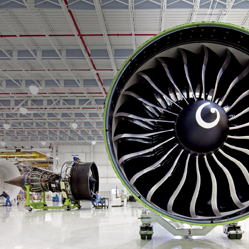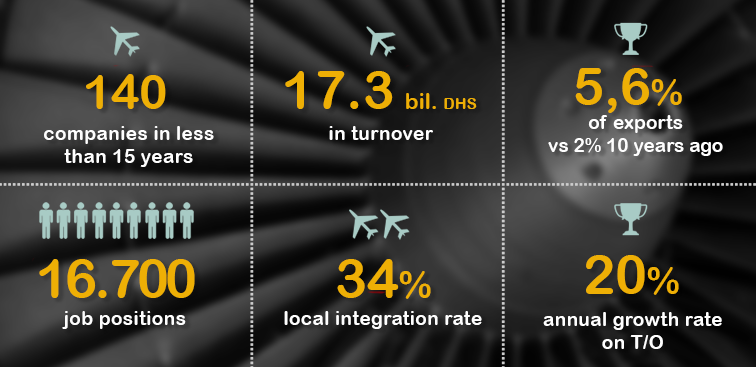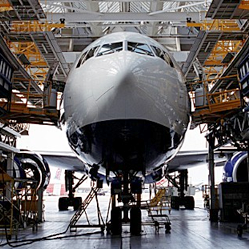INTRODUCTION

Outstanding dynamism
During recent years the Moroccan aeronautics sector has shown an outstanding dynamism and remarkable growth. The development of varied sectors, especially in wiring, mechanics, sheet metal work, composites and mechanical assembly, has made Morocco a preferred destination for subcontracting in aeronautics.
A clear illustration of the growth of the aeronautics industry in Morocco is the establishment of the giant Bombardier group that is now a force driving the development of the sector, thanks to the substantial economic benefits resulting from the development of Moroccan exports and local industry. With an investment of around 200 million US dollars, the Bombardier project will ultimately create 850 direct jobs and 4,400 indirect jobs.
The recent establishment of other global players such as BOMBARDIER, EATON, HEXCEL, STELIA and ALCOA confirms Morocco's ability to attract industry leaders.
Professional associations of the sector:
- Moroccan Aerospace Industries Association (GIMAS) (www.gimas.org)
Main companies of the sector:
- BOMBARDIER, EADS, BOEING, SAFRAN, LISI AEROSPACE, LE PISTON FRANÇAIS, DAHER, SOURIAU, RATIER FIGEAC, EATON, AEROLIA, LES ATELIERS DE LA HAUTE GARONNE, ALCOA, HEXCEL, STELIA

Ecosystems
Ecosystems, the cornerstone of the Industrial Acceleration Plan 2014-2020, are designed to reduce sectoral fragmentation and to promote integrated development of industrial activities. The aim is to integrate the local industrial fabric around leading companies by encouraging mutually beneficial partnerships with SMEs, first by acting as catalyst and second by providing perspective and visibility, which in turn bring creativity, a sense of innovation and dynamism.
Appropriate and targeted support is provided to companies in the ecosystems regarding finance, industrial land and training.
The Industrial Development Fund (FDI), operational since 1 January 2015, allocates 3 billion dirhams per year for the period 2014-2120 to ecosystem companies to enable them to realize their ambitions in upgrading, development and internationalization.
State support is also backed up with integrated and competitive bank financing.
The ecosystem companies can also:
On 28 July 2015, performance contracts were concluded between the Minister in charge of Industry and the profession in order to support the launch of four aeronautics ecosystems in the following fields:
The implementation of these first four ecosystems will contribute by 2020 to create 23,000 new jobs, that is to say three folds the present workforce, to double the export turnover thus reaching 16 billion dirhams, achieve a 35% local integration and attract 100 new actors.
-
- Have access to quality industrial land thanks to the innovative concept of industrial rental parks;
- Benefit their employees through relevant staff training courses.
- Assembly
- Electrical Wiring Interconnection System (EWIS)
- Maintenance, Repair and Overhaul (MRO)
- Engineering.
ASSISTANCE AND SUPPORT
Integrated and innovative support measures have been implemented to benefit the aeronautical ecosystems:
Tailored financial support:
Training opportunities:
Under the Investment Charter, the FPI offers partial coverage by the Government of cedrtain expenses related to the acquisition of property (up to 20% of the cost of land), external infrastructure (up to 5% of the total amount of the investment programme, or 10% in the case of an investment in the sector of spinning, weaving or finishing) and vocational training (up to 20% of the cost of the training).
These contributions may be combined as long as the total contribution of the state does not exceed 5% of the total investment programme; or 10% in the case of investment in the sector of spinning, weaving or finishing; or when the investment project is located in a suburban or rural area.
Eligibility criteria:
The Hassan II Fund offers grants of up to 15% of the total investment amount, capped at 30 million dirhams, with the following conditions:
With regard to the aeronautics sector alone, projects with an investment in capital equipment of more than 200 million dirhams (excluding import duty and taxes) can be completed in one or more phases (not exceeding a total duration of 60 months, extendible by 12 months in case of force majeure or unforeseeable circumstances) by considering each phase as a project eligible for the Fund's contribution.
The investment file must include the following documents:
Tax incentives are provided for by article 123-22°-a) of the General Tax Code and Article 7.1 of finance law No. 12-98 for the 1998/9 budget year as amended and supplemented by the following:
SMEs in the sector may benefit from special support within the programmes developed by the National Agency for the Promotion of Small and Medium-sized Enterprises (ANPME):
A free trade zone (ZFE) is a specified area of land devoted to export activities for industrial purposes and related service activities. Each free zone is created and delimited by a decree that determines the nature and business activities that can be established there.
The operational free trade zones are located at Tangier (Tanger Free Zone – TFZ and Tanger Automotive City – TAC), at Kenitra (Atlantic Free Zone – AFZ), at Casablanca (Midparc), at Rabat (Technopolis) and at Oujda (Technopole d’Oujda).
To obtain free zone status under law No. 19-94, companies must have obtained authorization from the local commission of the free export zone, which is presided over by the wali or governor of the region, and must make at least 70% of their turnover from exports.
Free zone status allows for the exemption of foreign trade and exchange controls, as well as access to the following state aid:
Tax incentives resulting in:
Customs benefits:
Exemption from import duties, and simplified customs procedures;
Unlimited exemption from value added tax in respect of products delivered and services supplied to the free export zones and from the subjected territory;
Administrative facilitations:
Exemption from registration fees and stamp duty on instruments of incorporation or increases in the capital of the company, as well as on land acquisitions; The establishment of a one-stop service to the investor.
-
- Support companies driving the ecosystem;
- Primes aux premiers investissements dans les métiers pionniers définis par écosystème.
- Financial support for new companies
- Financial support for extension investments
- Intended to train target profiles with a direct aid of up to 6000 euros / person.
- Attractively priced rental property
- 97 hectares of rental property reserved for the ecosystem’s companies, 63 of which are based in Nouaceur where the Midparc Platform is located, offering ad hoc services and quality infrastructure.
- The remaining of the real estate dedicated to the ecosystem is located in Tangiers (19.5 hectares) and other regions of the Kingdom (14.5).
- The investment project must meet at least one of the following five criteria:
- Represent an amount of 200 million dirhams or more over a 3-year period;
- To be located in one of the provinces or prefectures mentioned in Decree No. 2-98-520 dated 5 Rabii I 1419 (30 June 1998);
- Create a minimum of 250 stable jobs over 3 years;
- Provide technology transfer;
- Contribute to the protection of the environment.
- 30% of the cost of professional buildings on the basis of a maximum unit cost of 2,000 dirhams per square meter before tax (excluding any contributions by the state for the acquisition of property and/or the construction of professional buildings);
- 15% of the cost of acquisition of new capital goods (excluding import duty and tax) (excluding any contributions by the state for the acquisition of capital goods).
- The statutes of the company;
- A detailed description of the investment project;
- The references of the investor;
- The cost of the project and the number of jobs created;
- The method of financing the project;
- The architectural plans of the buildings;
- Surveying certificate;
- A list of new equipment to purchase, with quotes;
- Installation plans with all equipment shown to scale, with the designation of all equipment (in line with the aforementioned list of equipment);
- The project schedule;
- A completed application form requesting assistance from the Hassan II Fund.
- The exemption from import duty on capital equipment, materials and tools necessary for the implementation of an investment project with a total cost greater than 200 million dirhams during 36 months after the signing of the investment agreement; this exemption is extended to parts, replacement parts and accessories imported at the same time as the aforementioned equipment;
- The exemption from VAT on imports of capital equipment, materials and tools necessary for the implementation of an investment project with a total cost greater than 200 million dirhams until 36 months after the start of activity by the company or from the date of issuance of the building permit, and which may be extended by six months in the event of force majeure (renewable once); this exemption is extended to parts, replacement parts and accessories imported at the same time as the aforementioned equipment.
- Exemption from income tax (IR) during the first 5 years, and then a reduction of 80% of tax on gross earned income during the following 20 years;
- Exemption from corporation tax (IS) for the first 5 years, and then a rate of 8.75% for the following 20 years;
- Exemption from professional tax for the first 15 years;
- Exemption from urban tax for the first 15 years;
- Exemption from participation in national solidarity;
- Exemption from tax on income from corporate rights, dividends and similar income for non-residents and a reduction in tax to 7.5% for residents;
TRAINING
The training of human resources is a strategic activity of the Industrial Acceleration Plan 2014-2020. The availability and quality of human resources determine the attractiveness of Morocco as a destination, and increase the productivity and competitiveness of the companies.
Amongst other things the strategy aims at providing the ecosystems in place with skilled profiles.
The detailed mapping of training needs - with a quantification of the human resource requirements by sector, profile, region and year - and the identification of training opportunities available in Morocco are ongoing, which will enable the development of a national training plan.
For the aeronautics sector, the Industrial Acceleration Plan foresees an expansion of the Moroccan Aerospace Institute (IMA) (at Nouaceur) to reach an annual capacity of 1,200 trainees. The objective is to meet the growing demand for labour expressed by the sector.
The aeronautics companies can benefit from direct aid for training of up to 60,000 dirhams per person.
Special features of the IMA:
Consult the list of training needs for performance contracts signed by end - May 2017
-
- Training modes: upon hiring and continuous training (particularly targeting the 8 areas with high added value: composite materials; metal working; assembly; engineering and design; electrical systems and wiring; repair of engines, parts and equipment; maintenance and transformation; modification and decommissioning of aircraft);
- Mode of governance: public-private partnership (delegated management);
- Intake: 800 students;
- Start date: April 2011.
Reception Infrastructure
In the framework of the Industrial Acceleration Plan, the Ministry plans for the mobilization of 1,000 hectares to create Integrated Industrial Rental Parks (PIL) with turnkey premises: each park will include a one stop shop for administration, a local job pool, ad hoc services and a training programme.
In parallel, general and sectoral Integrated Industrial Platforms (P2I), possibly benefiting from the free zone status, guarantee the availability of property at an attractive price, comprehensive and diverse real-estate and logistics options conforming to the best international standards, as well as on-site services and a one stop shop for administration.


